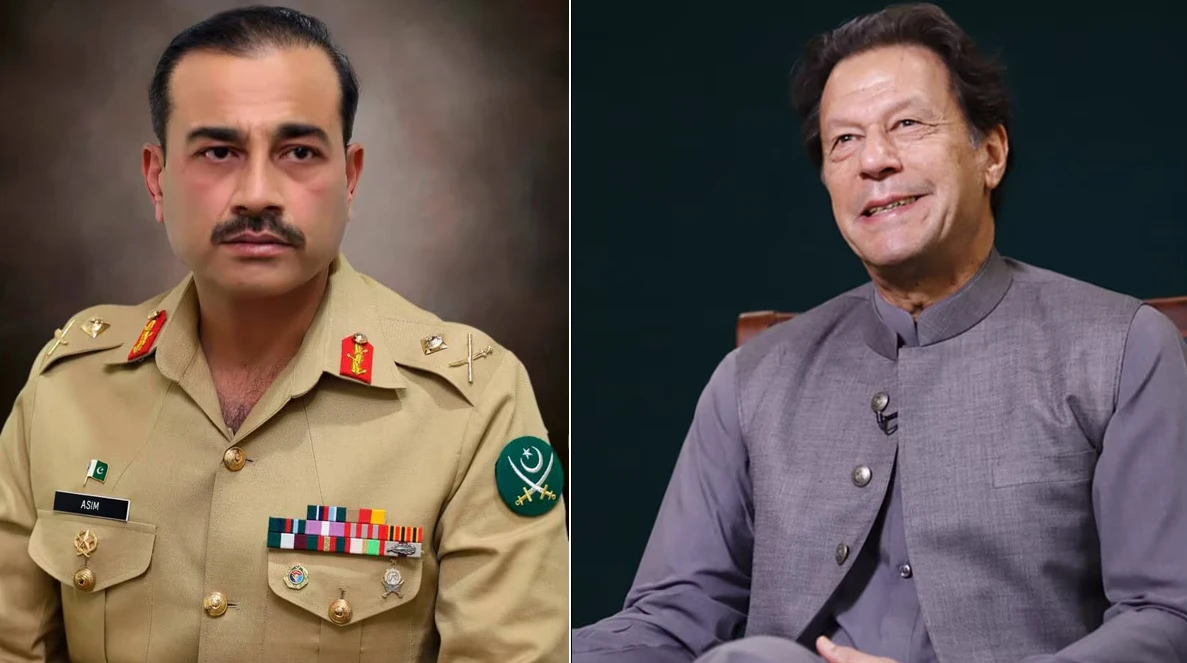New twist in PTI founder’s strategy towards Military Establishment

Stay tuned with 24 News HD Android App

Carrying the legacy of 9th May terrorist attacks on military and defence installations, the founder of Tehrik-e-Insaaf (PTI) has said he is going to write a letter to the Chief of Army Staff (COAS), Gen Asim Munir to inform him about the recent events in Azad Kashmir and the prevailing political circumstances in the country.
The PTI chief spoke to journalists on May 17 in Adiala Jail and the script of his assertions was uploaded by his party’s media wing on its X account. “I will write a letter to the army chief not for myself, but for the country and I have instructed a team of my lawyers to prepare a letter and inform me’, he said.
One must realise that the mindset of the PTI chief is that a deal with the Military Establishment was signed in 2011 when the Imran Project was conceived and the foundation of a hybrid system was laid. “He thinks that Gen Bajwa shifted his loyalties to the mainstream politicians in 2022 and thus betrayed him.
On the other hand, the army leadership realised that the PTI leader was becoming larger than his boots and challenging his benefactors. Even though at the eleventh hour of the PTI regime, Gen Bajwa tried his best to persuade Imran Khan to sit with the Opposition and sort out political issues. But the PTI Chief was in denial mode and threw the proposal into the dustbin.
Political pundits are bewildered by the PTI chief’s desire to write a letter to the Army chief in the backdrop of recent statements of COAS Gen Asim Munir and Director General Inter-Services Public Relations (DGPR), Gen Ahmad Shareef. Both the generals categorically stated that there was no question of any deal or relief to the planners, facilitators and culprits of 9th May.
In addition to this, they also made it clear that those who were under arrest and facing criminal charges in the military or the civilian courts would be punished. But those found innocent and not involved in the criminal acts would be set free. But at the same time, they also made it loud and clear that those who planned the events of that unfortunate day would be brought to books as well.
The PTI Chief has been changing his stance regarding to role of the Military Establishment. At one point in time, he has been praising the army leadership for their patronage of his government. “There has been no general like Gen Qamar Javed Bajwa who is a great democracy lover”. On another occasion, he praised the then Director General of Inter-Service Intelligence (ISI) for helping his government in the passage of the federal budget and legislation. “When the budget was presented in the National Assembly, the agencies used to help us gather the required number of MNAs”, IK confessed.
But everything changed once PTI’s government was sent packing through a vote of no-confidence which was a constitutional provision. The PTI Chief first accused the United States official of toppling his government in connivance with the then-opposition and later shifted the whole blame on the then Army Chief General Bajwa and his associates.
Besides shifting the blame, he termed the military top brass as Mir Jaffers and Mir Sadiqs, the most horrible titles to be attached to any military personnel.
Then the PTI Chief launched a long march to stall the appointment of Gen Asim Munir as the COAS but miserably failed in his attempt after he was attacked near Wazirabad while leading the marchers.
There is hardly any doubt that the Military Establishment has all along been playing a ‘limited’ role in national politics in one form or another. But there was a turning point in the 2018 general elections when this role not only became visible but blasted all previous records of interference by undemocratic forces.
It was planned even earlier in 2011 when on 30th October, Pakistan Tehrik-e-Insaaf (PTI) held a mammoth rally at Minto Park. It was termed as the re-launch of Imran Khan as well as his party PTI.
This plan gained momentum in 2014 when Imran Khan decided to start a Tsunami March with the singular objective of sending Nawaz Sharif home and toppling his elected government on the pretext of rigging in the 2013 general elections.
The PTI demanded that besides the removal of Nawaz Sharif and the dismissal of his government, electoral reforms be introduced, and corruption should be eliminated. It also called for snap general elections.
The PTI was supported in its protest plans by a religious cleric, Allama Dr Tahirul Qadri and his party The Awami Tehrik also launched a similar march titled Inqilab March.
To cut a long story short, both these marches culminated in a sit-in (Dharna) at D-Chowk in front of the Parliament buildings. The long marches started on August 14, 2014, and Dharna continued for 126 days. The dharna was finally called following a terrorist attack on an Army Public School in Peshawar on December 16 that claimed 150 lives including more than 134 children.
During this Dharna the PTI Chief often mentioned the umpire's finger which was an apparent reference to the then Army Chief.
But as Gen Asim took the oath of his office as Army Chief, he declared the Military Establishment as apolitical because in his wisdom the Army must stay neutral in the political arena. In his reaction to this, the PTI Chief termed neutrals as ‘animals’.
With this background how is the PTI Chief expecting any softening of the heart in the Military Establishment? What will be the next move of the PTI’s leadership and how would any such move be reacted to by the Army leaders is a million-dollar question.
